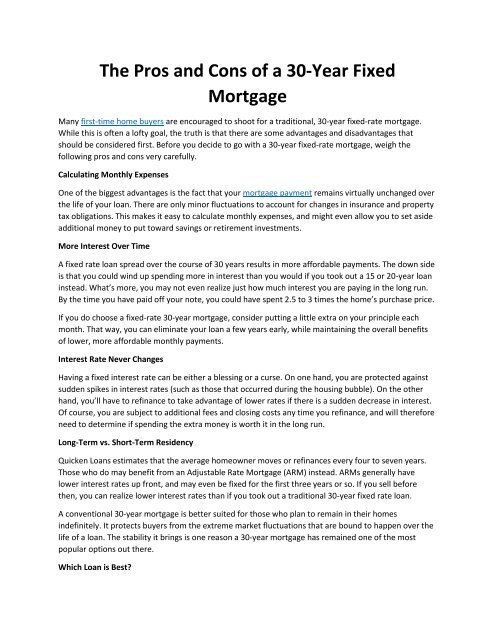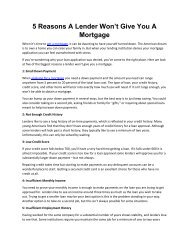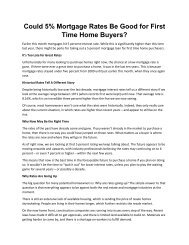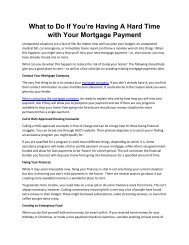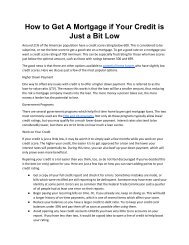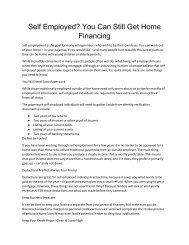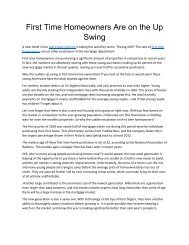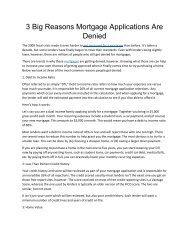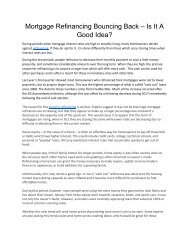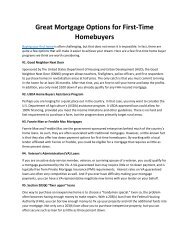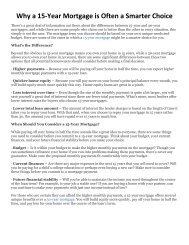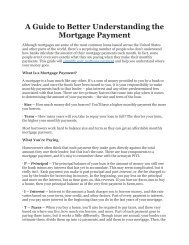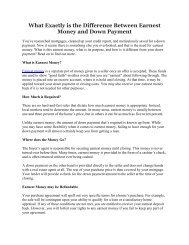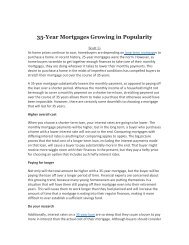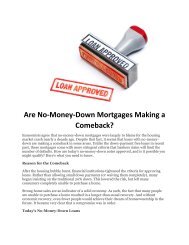The Pros and Cons of a 30-Year Fixed Mortgage
Many first-time home buyers are encouraged to shoot for a traditional, 30-year fixed-rate mortgage. While this is often a lofty goal, the truth is that there are some advantages and disadvantages that should be considered first. Before you decide to go with a 30-year fixed-rate mortgage, weigh the following pros and cons very carefully. Visit: http://www.ratewinner.com/
Many first-time home buyers are encouraged to shoot for a traditional, 30-year fixed-rate mortgage. While this is often a lofty goal, the truth is that there are some advantages and disadvantages that should be considered first. Before you decide to go with a 30-year fixed-rate mortgage, weigh the following pros and cons very carefully. Visit: http://www.ratewinner.com/
Create successful ePaper yourself
Turn your PDF publications into a flip-book with our unique Google optimized e-Paper software.
<strong>The</strong> <strong>Pros</strong> <strong>and</strong> <strong>Cons</strong> <strong>of</strong> a <strong>30</strong>-<strong>Year</strong> <strong>Fixed</strong><br />
<strong>Mortgage</strong><br />
Many first-time home buyers are encouraged to shoot for a traditional, <strong>30</strong>-year fixed-rate mortgage.<br />
While this is <strong>of</strong>ten a l<strong>of</strong>ty goal, the truth is that there are some advantages <strong>and</strong> disadvantages that<br />
should be considered first. Before you decide to go with a <strong>30</strong>-year fixed-rate mortgage, weigh the<br />
following pros <strong>and</strong> cons very carefully.<br />
Calculating Monthly Expenses<br />
One <strong>of</strong> the biggest advantages is the fact that your mortgage payment remains virtually unchanged over<br />
the life <strong>of</strong> your loan. <strong>The</strong>re are only minor fluctuations to account for changes in insurance <strong>and</strong> property<br />
tax obligations. This makes it easy to calculate monthly expenses, <strong>and</strong> might even allow you to set aside<br />
additional money to put toward savings or retirement investments.<br />
More Interest Over Time<br />
A fixed rate loan spread over the course <strong>of</strong> <strong>30</strong> years results in more affordable payments. <strong>The</strong> down side<br />
is that you could wind up spending more in interest than you would if you took out a 15 or 20-year loan<br />
instead. What’s more, you may not even realize just how much interest you are paying in the long run.<br />
By the time you have paid <strong>of</strong>f your note, you could have spent 2.5 to 3 times the home’s purchase price.<br />
If you do choose a fixed-rate <strong>30</strong>-year mortgage, consider putting a little extra on your principle each<br />
month. That way, you can eliminate your loan a few years early, while maintaining the overall benefits<br />
<strong>of</strong> lower, more affordable monthly payments.<br />
Interest Rate Never Changes<br />
Having a fixed interest rate can be either a blessing or a curse. On one h<strong>and</strong>, you are protected against<br />
sudden spikes in interest rates (such as those that occurred during the housing bubble). On the other<br />
h<strong>and</strong>, you’ll have to refinance to take advantage <strong>of</strong> lower rates if there is a sudden decrease in interest.<br />
Of course, you are subject to additional fees <strong>and</strong> closing costs any time you refinance, <strong>and</strong> will therefore<br />
need to determine if spending the extra money is worth it in the long run.<br />
Long-Term vs. Short-Term Residency<br />
Quicken Loans estimates that the average homeowner moves or refinances every four to seven years.<br />
Those who do may benefit from an Adjustable Rate <strong>Mortgage</strong> (ARM) instead. ARMs generally have<br />
lower interest rates up front, <strong>and</strong> may even be fixed for the first three years or so. If you sell before<br />
then, you can realize lower interest rates than if you took out a traditional <strong>30</strong>-year fixed rate loan.<br />
A conventional <strong>30</strong>-year mortgage is better suited for those who plan to remain in their homes<br />
indefinitely. It protects buyers from the extreme market fluctuations that are bound to happen over the<br />
life <strong>of</strong> a loan. <strong>The</strong> stability it brings is one reason a <strong>30</strong>-year mortgage has remained one <strong>of</strong> the most<br />
popular options out there.<br />
Which Loan is Best?
Is a <strong>30</strong>-year fixed rate mortgage the best option? That all depends on your goals. Before choosing a loan<br />
based on what others are telling you, take time to compare all your options. Only then can you truly be<br />
sure that a fixed rate loan is the right choice for you.


